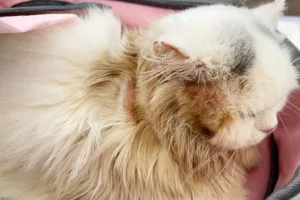Have you recently started noticing patches of hair loss in your cat? Most of the time, it is nothing to be concerned about, but it is still recommended to take your feline friend to a vet for a general health checkup. Reasons your cat may be losing hair could be a poor diet, allergies, fleas and ticks, stress, or even hypothyroidism.

5 Causes of Hair Loss
Hair loss in cats is normal. Usually, the causes are simple, and the hair loss resolves on its own or with a few small lifestyle changes. However, you should still monitor your cat for any odd behavior.
Listed below are five common causes of hair loss in cats:
1. Poor Diet
There are various vitamins and minerals that your cat needs in order to have a bright, long, and shiny coat. If their diet does not have enough of those nutrients, it is possible to lose hair. Thankfully, hair loss is not permanent.
If you suspect that your cat’s diet is lacking, look at the ingredients on the food you regularly feed them. This could point at an exact cause or deficit. Your cat should be able to grow their hair back fully after they are eating a healthy and nutrient-filled diet!
2. Skin Allergies
One of the leading causes of coat and skin issues in cats is skin allergies. Anything can cause a skin reaction in cats if they are allergic to it. The hard part about skin allergies in cats is that they are hard to detect. Currently, there is no 100% correct test that can indicate what your cat has an allergic reaction to.
Instead, it is up to you and your local vet to write down the possibilities and go through a long process of elimination. As long as your cat is away from the allergens, the hair will grow back. Usually, where there is hair loss, you can also see hives, red marks, and open wounds from scratching and biting.
3. Fleas and Ticks
Flea infestations are never fun, especially for your poor feline friend! Fleas and ticks bite into your cat’s skin and latch on. From there, they feed off your cat’s blood and sometimes carry diseases. Although it is rare to contract a disease from a flea or tick, your cat can experience severe rashes that can later develop into hair loss.
Fleas are not easy to get rid of, but there are a few measures you can take to lower the chances. Every day, especially if your cat plays outside, you should check their skin for small flea and tick bite marks. The faster you catch these small parasites, the easier it is to get rid of them!
4. Stress
Believe it or not, high-stress levels can also contribute to feline hair loss! If your cat has been through trauma and is nervous, this can cause them to scratch their bodies as a response. Although there is nothing wrong with occasionally scratching for relief, if this pattern continues, they can leave open wounds and scratches on their skin.
5. Hypothyroidism
The thyroid glands are in charge of a lot of different hormones, including the growth hormone. If your cat has damage to these glands or has an autoimmune disease like hypothyroidism, it can lead to a decrease in hair follicles.
Hypothyroidism is a condition where the thyroid glands in your cat work slowly. This means that the gland does not produce enough of the growth hormone, leaving common side effects like hair loss. With the proper medications and treatments, your cat should be able to grow back the patchy and uneven pieces.
Preventing Feline Hair Loss
How do you prevent your cat from losing hair when there are so many causes? Making sure your cat’s diet is healthy and full of the proper nutrients and minerals is one step to prevent your cat from losing hair. Protecting them from fleas and ticks, and giving them a stress-free home environment are other ways to keep your cat’s coat healthy. Sometimes, however, an allergy or a genetic trait may cause your cat to lose hair.
If you are worried about your cat’s hair loss, the best thing to do is to see a vet to pinpoint the cause. A veterinarian may not be able to pinpoint the exact cause right away, but they will be able to get you and your cat on the right track with professional guidance. Although you could try to find the cause of your cat’s hair loss yourself, it will cost you lots of time and money trying out different foods, supplements, and lifestyle changes.
If you are worried about your cat’s hair loss, you should reach out to your local vet. If you live near Palos Heights, IL, you can reach out to Palos Animal Hospital at (708) 448-6600 with any questions or concerns!


